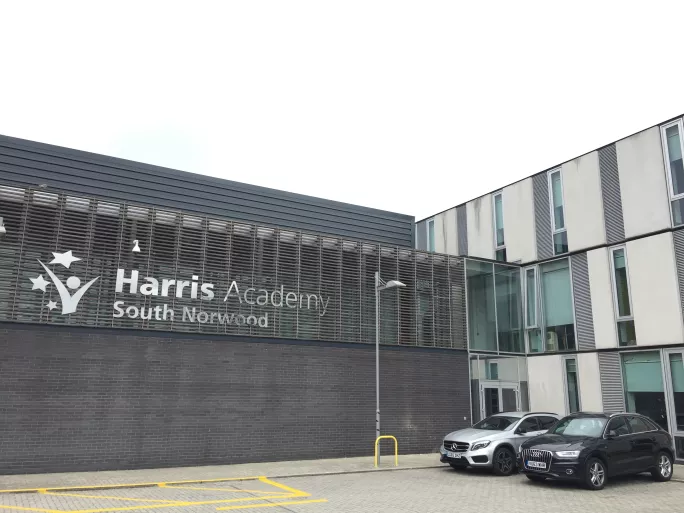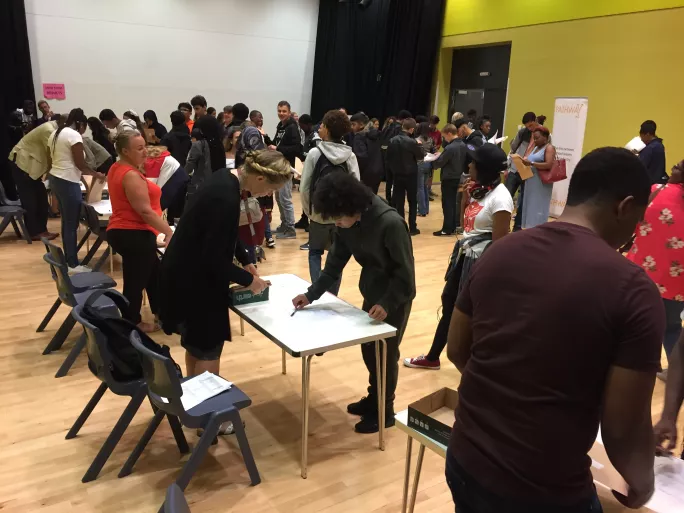- Home
- GCSE results day: How was it for teachers?
GCSE results day: How was it for teachers?

For Gizle Landman, GCSE results day started at midnight on Tuesday.
Realising that she would not be able to sleep in the knowledge that her school’s data was ready to download when the clock struck 12, the head of Harris Academy South Norwood in South London was up until the early hours calculating how her pupils had performed.

And this morning, from 10am, the young people themselves were able to find out the same.
The gaggle of expectant teenagers spilled out of the reception area and into the drizzle outside as they waited for the doors to the hall to open.
‘The overall progress really pleased us’
Inside, the cavernous space was decorated with crimson motivational banners: “learning first”, “high aspiration”, “growing confidence” and, most appropriately for 23 August 2018, “celebrating success”.
And for Ms Landman, today was indeed a day of success. “It’s the overall progress of the individual students that has really pleased us this year,” she says.

Today’s Year 11 is, of course, the first cohort to have sat almost exclusively the reformed, tougher GCSE qualifications, with 9-1 grades and an emphasis on terminal exams instead of coursework and modules.
“Yes, it brought extra stresses,” says Rob Hitch, senior vice-principal.
The challenge of GCSE reforms
“I guess the real challenge, rather than the change in numbers, is the increased rigour of the content, and the depth of content that is necessary, so I think that brings extra stresses for the students and also for the teachers, and they have to adjust.”
But he stresses that the school’s emphasis on “making sure we had a strong curriculum regardless of the exam specification” meant that staff were well prepared for the changes.
That view is echoed by Rachel Denison, the school’s head of geography, who describes the extra workload and pressure on teachers to deliver the new exam as “a challenge”.
“Particularly now with how fieldwork is assessed in the exam. [It is] a complete change for us from controlled assessment, and wrapping our head around how they are going to assess that in an exam, that will get better with time,” she adds.
The ongoing transition to a fully reformed GCSE system meant that when Mohammed Kadir picked up his results, he was celebrating 11 numerical grades, and one lonely-looking alphabetical grade in economics.
“I’m shocked”, he says simply, minutes after discovering that he had achieved the top grade 9 in both English literature and maths. “It’s overwhelming,” he adds.
The would-be stock market trader will now progress to the school’s sixth form to take A levels in maths, further maths, economics and physics.

Also in shock is Zuzanna Pazola, who says she “was predicted good grades, but I was scared I was not putting in enough work”.
Her results today proved that she had.
Two 9s, plus a cluster of 7s, 8 and A*s, allows her to do the four A levels she had her heart set on, and keeps her ambition to secure a place at Oxbridge on track.
“Warmly buoyant and happy” is how Nick Soar, the academy’s executive principal, describes the feelings of staff today, at the end of their own GCSE odyssey.
Explaining new GCSE grades to parents
Today, part of his job has been to emphasise to his pupils just how well they have done.
“I think what’s interesting about our cohort is a lot of them lack confidence and are insecure,” he says, “and not a lot of them believe they can achieve, and one of the over-riding emotions I felt going around today has been people not quite being able to believe they have got a 5 or a 6 in their subject.”
He has been explaining to parents what the new numbered grades mean, and how well their children have done.
”[One pupil’s] whole family had come down to get the results, and she had done really, really well: she had got a bank of 7s and 8s and a couple of 9s.
“I had to explain that this was a really good result and they needed to be really, really proud.”
Keep reading for just £1 per month
You've reached your limit of free articles this month. Subscribe for £1 per month for three months and get:
- Unlimited access to all Tes magazine content
- Exclusive subscriber-only stories
- Award-winning email newsletters



